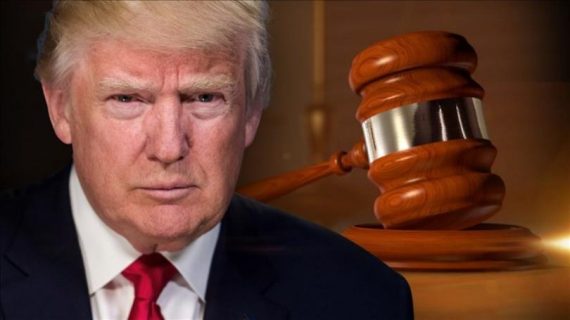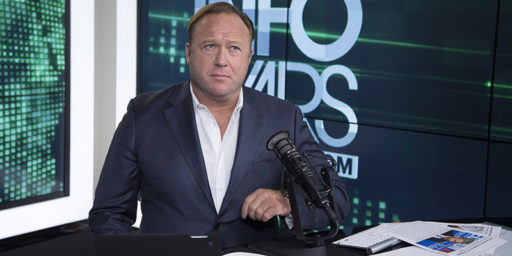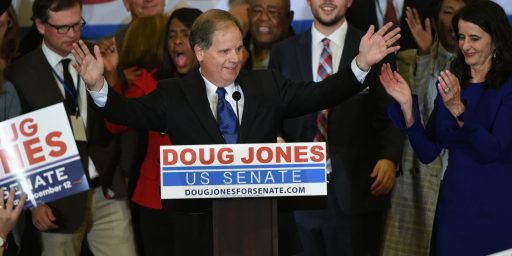New York Judge Says Defamation Suit Against Trump Can Go Forward
A state trial court Judge in New York has ruled that a defamation lawsuit filed in Manhattan against President Trump can go forward.
A New York State Judge has ruled that a civil lawsuit filed by a former contestant on The Apprentice who has accused President Trump of sexual harassment can go forward notwithstanding the fact that the Defendant is the President of the United States:
A New York State judge ruled on Tuesday that a defamation lawsuit brought by a woman who has said President Trump made unwanted sexual advances could go forward, raising the possibility of a public airing of other allegations of sexual misconduct against the president.
The decision by Justice Jennifer Schecter of State Supreme Court in Manhattan paved the way for lawyers to seek depositions from several women who accused Mr. Trump of sexual harassment before he was elected and to subpoena Trump campaign records related to his female accusers.
Justice Schecter rejected Mr. Trump’s argument that a state court has no jurisdiction over a sitting president. She cited a United States Supreme Court ruling that allowed Paula Jones to bring a sexual harassment suit against President Bill Clinton.
“No one is above the law,” Justice Schecter wrote. “It is settled that the president of the United States has no immunity and is ‘subject to the laws’ for purely private acts.”
The plaintiff in the lawsuit, Summer Zervos, is a former contestant on Mr. Trump’s show “The Apprentice.” In her complaint, she said Mr. Trump defamed her during the 2016 presidential campaign by repeatedly describing her accounts, and those of other accusers, as “total lies” and “made-up nonsense to steal the election” — potentially for fame or financial gain.
Besides arguing that the president could not be sued in state court under the Supremacy Clause, Mr. Trump’s lawyer, Marc E. Kasowitz, had argued that Mr. Trump’s comments about the women, made during a hard-fought election, amounted to political speech protected under the First Amendment. He also had argued that Ms. Zervos was not held up to the level of ridicule or contempt necessary to prove defamation.
Justice Schecter disagreed. She said Mr. Trump’s comments about Ms. Zervos telling “phony stories” could be construed as defamatory, suggesting she “is contemptible because she ‘fabricated’ events for personal gain.”
Ms. Zervos’s suit was being closely watched by other women who came forward during the presidential race with accusations against Mr. Trump. Some have said they would be willing to give depositions in the case.
During the campaign, more than 10 women made allegations against Mr. Trump ranging from unwanted touching to sexual assault. Most of them spoke out after the release of an “Access Hollywood” recording on which he bragged about kissing and groping women without their consent.
“The rule of law and sound reason have prevailed today,” one of Ms. Zervos’s lawyers, Mariann Wang, said. “We are grateful for the opportunity to prove that that defendant falsely branded Ms. Zervos a phony for telling the truth about his unwanted sexual groping.”
It remained unclear if Mr. Trump would appeal the ruling. Mr. Kasowitz did not respond on Tuesday to email and voice mail messages.
Ms. Zervos first came forward with her story in October 2016. She said Mr. Trump had kissed and groped her without her consent on two occasions in 2007, once during a job interview at his New York office and again during a later business meeting at Los Angeles hotel.
That day, Mr. Trump denied he had greeted her inappropriately. Over the following days, he released a barrage of vehement denials about the allegations from Ms. Zervos and nine other women, calling them fabrications, lies and hoaxes.
Ms. Zervos filed suit two months after the election, asserting she had been “debased and denigrated” by Mr. Trump’s comments. She is represented by Ms. Wang and Gloria Allred, who has represented several women who have accused high-profile men of sexual wrongdoing.
From the start, Ms. Allred made it plain that the goal of the suit, beyond economic damages, was to compel Mr. Trump to admit that he lied when he said Ms. Zervos fabricated her allegation.
Mr. Trump’s lawyers, led by Mr. Kasowitz, mounted a full-court defense, arguing the suit should be dismissed as meritless, or should be halted until Mr. Trump leaves office. Mr. Kasowitz argued that the courts have repeatedly interpreted the supremacy clause of the Constitution to mean a state court cannot exert control over a president while he is in office.
The primary legal issue in the case, whether or not a sitting President can be sued in state court while in office, was really pretty much the legal equivalent of a “no-brainer” thanks to a U.S. Supreme Court decision dating back more than twenty years ago to the Clinton Administration. In Clinton v. Jones, a decision handed down by the Supreme Court in 1997, a largely unanimous Court ruled that a Federal Court civil case brought against former President Bill Clinton by Paula Jones for events that occurred while he was Governor of Arkansas and she was a state employee could proceed forward notwithstanding the fact that the Defendant is the sitting President of the United States. Jones, of course, had filed a lawsuit alleging that Clinton had sexually harassed her in an incident dating back to 1991, claiming that Clinton had her summoned and proceeded to proposition her and engage in other behavior of a sexual nature.
In its ruling, the Supreme Court ruled that the fact that Clinton was President of the United States does not, on its own, grant him any kind of immunity from civil lawsuits for conduct that occurred prior to the time he became President, nor does it require a court hearing such a case to put the case on hold until after the President has left office. To the extent any such immunity existed, it could be found in a concurrence filed by Associate Justice Stephen Breyer in which he stated that there could be some circumstances where a President could seek to delay a civil lawsuit from going forward if it could be shown that responding to and participating in the lawsuit could somehow be shown to interfere with official Presidential duties. Breyer was careful to note, though, that such circumstances would seem to be quite limited and that, in any case, they did not exist with the underlying lawsuit in Clinton v. Jones. Thus, the lawsuit went forward, which of course led directly to a deposition in which Clinton lied under oath about his relationship with Monica Lewinsky, which led directly to a crisis that consumed much of the last two years of Clinton’s Presidency.
In it’s ruling in Clinton v. Jones, the Justices made clear that their decision was only dealing with civil lawsuits in Federal Court and specifically said that they were not ruling on potential issues that might arise with a civil lawsuit in a state court. On the face of it, though, it seems clear that there is no reason to differentiate between a civil lawsuit in state and Federal court. In both cases, the President is capable of hiring competent counsel to represent him in the appropriate jurisdiction, and given the fact that civil cases typically don’t require Defendants to be present in court for proceedings other than a trial on the merits, it’s hard to see how a civil lawsuit in Manhattan should be treated any differently from a Federal Court proceeding that was originally filed in the United States District Court in Arkansas. Additionally, to the extent that the President would be required to make himself available for a deposition the Jones case shows that this too is entirely possible and would not disrupt the President’s focus on his primary duties.
In her ruling in the Zervos case, Justice Jennifer Schecter of State Supreme Court in Manhattan, which is the trial-level court in the New York State court system, relied largely on the Jones case in ruling that Trump was not immune from suit in state court. As I noted above, this ruling seems to be self-evident on its face. Judge Schecter also noted that the Complaint that Zervos had filed sufficiently laid out a claim for defamation under New York State law. Essentially, Zervos is claiming in her lawsuit that Trump defamed her when he stated that the claims that she came forward with in October 2016 in the wake of the Access Hollywood tape about Trump having harassed her sexually were fabrications and that she and the other women accusing him of improper behavior were lying. That type of statement would generally be sufficient to form the basis for a defamation claim at this early stage of the case, and Judge Schecter was correct to let the case go forward on this basis.
In addition to all the other legal claims that are being brought against Trump, including both the lawsuit filed by adult film star Stormy Daniels and a separate claim brought against the publisher of National Enquirer by a former Playboy model who claims to have had an affair with Trump around the same time as Daniels, we can now add the Zervos case. As many legal analysts have pointed out in the past day or so, this case could prove to be among the most potent of the claims against Trump due to the fact that the type of claim that Zervos has alleged and the manner in which Trump dismissed her initial allegations open Trump up to a wide-ranging discovery regarding all of the allegations of sexual harassment and abuse that have been made against him in the past, and others which could come out of the woodwork in the future.
Before we get there, Trump’s attorneys could seek to appeal Judge Schecter’s ruling to the Appellate Division of the New York Supreme Court and, from there, to the New York Court of Appeals, the highest court in the Empire State’s Judicial System. On its face, though, it seems as though any appeal of this decision would be unlikely to succeed. The U.S. Supreme Court’s decision in the Jones case is clear on the issue of Presidential immunity from suit, and there doesn’t appear to be any ground on which a distinction can or should be made in this case. As they say, stay tuned.
For reference, here’s a copy of the underlying Complaint that Summer Zervos filed in this case:
Zervos v. Trump Summons and Complaint by Doug Mataconis on Scribd
And here is Judge Schecter’s opinion:
Zervos v. Trump Opinion by Doug Mataconis on Scribd







“You know, I’m automatically attracted to beautiful–I just start kissing them. It’s like a magnet. Just kiss. I don’t even wait.” — Donald J. Trump, 2005
He’s admitted of his own free will that he does what he’s accused of doing.
As much as I despised Bill Clinton at the time, and fervently believed he was a predator morally unfit for the office of the Presidency, it seemed ludicrous to me that a sitting President should be subject to lawsuits that can distract his attention from running the Executive Branch and its national security apparatus. I thought then and still think that claimants ought be able to file cases, which, if not dismissed in summary judgment, be put into abeyance until after the presidency. The clock would stop ticking on statutes of limitation, etc. but the case would just freeze. But a 9-0 Supreme Court disagreed.
That Clinton and now Trump are the only two presidents hamstrung by this precedent is interesting. Clearly, most of our presidents have had the moral character to preclude such suits. But there’s a real Pandora’s Box situation here.
@James Joyner: I agree with you that this could become a slippery slope. There are a couple of things that make Trump unique though. One is that it would be trivially easy to prove B.S. on any claim that his duties of the presidency are so onerous that he can’t respond to a lawsuit He basically lounges around watching Fox News and tweeting, when he isn’t out golfing or dropping in on guests at his golf courses. And second, Trump has used his personal wealth to batter down people seeking justice against him time after time after time. The fact that, due to anti-Trump sentiment, some of these people can get backing to bring their cases is simply justice, and that backing would largely disappear once Trump stepped down.
So, yes, it is a slippery slope. But Trump is weaker than any other president in making that argument. And the reality is that it’s not a choice on whether to go down the slippery slope or not. Because Trump is bringing us down another, worse, slope: the descent into banana-republicanism where government officials are literally above the law. So the real choice is “which bad path do we take?”
OT, but John Dowd, Trump’s lead lawyer, has resigned.
@James Joyner:
It may cost Trump hundreds of hours of TV time.
But we know what’s going to happen. After all appeals are exhausted, the Pervert in Chief will settle.
@MarkedMan:
Maybe it is. But maybe, too, it winds up getting powerful people to refrain form abusing, assaulting, and defrauding people who are not in the best position to offer resistance.
And that wouldn’t be bad at all.
@James Joyner:
Um…yeah, sure…
Strikes me as ironic that while his attorneys are arguing that he’s immune from lawsuits, his other attorneys are out suing people.
Truth is…the more we can distract Donny Dennison from running the Executive Branch, the better off we all are.
@James Joyner: Maybe if you have a very shady past, you shouldn’t seek out the spotlight of the Presidency.
Just sayin’
Did anyone see where John Dowd has quit Trump’s team of lawyers?
Sounds like the comment said by one of Rod Blagojevich lawyers upon quitting:”I don’t insist that clients take my advice, but I do think they should at least listen to it.”
(whoops forgot an apostrophe)
@grumpy realist: @CSK:
Has to be fake news because Trump told us just 11 days ago that he was super happy with his entire legal team and name-checked Dowd.
Then he hired the clueless and senile Joe DeGenova.
And tried to hire Ted Olson who is not quite dumb enough to step into thatquicksand.
And then Dowd is out.
OT…in the Septuagenarian Smackdown…I predict Biden will take the Orange Tub of Goo in the first round…
http://nymag.com/daily/intelligencer/2018/03/trump-biden-would-go-down-fast-and-crying-in-a-fight.html
@michael reynolds:
He’s just doing what all very stable geniuses do.
@michael reynolds: My favorite contribution to the ‘tic-toc’:
Saturday: Dowd suggests Mueller probe be concluded.
Sunday: Congressman Gowdy says if Dowd’s has an innocent client he should act like it.
Thursday: Dowd resigns.
@grumpy realist:
I can imagine the scene. Trump would have asked about what to do in a particular situation when talking to Mueller, and then:
Dowd: Well, sir, better to remain silent and be taught a fool than to speak out and remove all doubt.
Trump: Oh, yeah? Takes one to know one, motherf***r!”
(If this seems familiar, it’s because something similar was once depicted in “The Simpsons”)